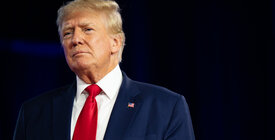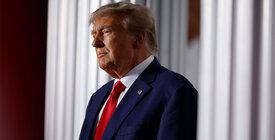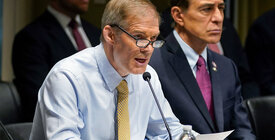After the unprecedented criminal indictment of former President Trump, many are predicting the raw political implications for what is expected to be a heated presidential primary campaign. However, a very different, but just as important, consequence of the indictment has been overlooked: its impact on election officials.
In the almost two and a half years since the 2020 election, Trump and his allies have pressured election officials around the country to illegally change election results, asserting bogus, debunked, and fanciful claims, such as vote-flipping caused by Chinese thermostats and ballot destruction by immolated chickens. Yet they have faced almost no consequences. After this very long and very public campaign, which has included false allegations against individual election officials, resulting in death threats and emergency family relocations, some election officials have reasonably assumed that the law is inadequate for protecting them or preventing vicious political interference — and this is the new norm.
According to a poll conducted last year, 52 percent of election officials were “not at all worried” about political interference prior to the 2020 election, and only 13 percent indicated that they were “very worried.” However, after Trump’s public efforts to interfere with the 2020 election results — such as the taped phone call during which he pressured Georgia Secretary of State Brad Raffensperger to “find 11,780 votes,” which would have resulted in Trump winning Georgia by 1 vote — the percentage of election officials who were “very worried” about political interference in future elections more than doubled, rocketing up to 29 percent. Simultaneously, the percentage of election officials who were “not at all worried” cratered, falling to 19 percent. It’s not surprising that one in five election officials is likely to leave the profession before the 2024 presidential election.
In good news, protecting our elections and election officials from political interference isn’t complicated. It simply requires holding accountable those who violate existing federal and state laws that prohibit efforts to manipulate election results. Federal law is clear: any person who “knowingly and willfully . . . attempts to deprive or defraud the residents of a State of a fair and impartially conducted election process, by . . . [the] tabulation of ballots that are known by the person to be materially false, fictitious, or fraudulent” is guilty of a felony. In 2017, the Department of Justice summarized the prohibition as follows: “Simply put, then, election fraud is conduct intended to corrupt . . . the process by which election results are canvassed or certified.” Moreover, conspiring to deprive someone of their right by, for example, intentionally miscounting votes, is a felony. Federal law provides additional protection against efforts to interfere with the presidential election, making it a felony to even attempt to intimidate or “corruptly persuade” someone to alter a record that is to be used in an “official proceeding” (such as the congressional certification of the Electoral College).
Multiple states, including Georgia, also have clear prohibitions against pressuring others to interfere with elections. North Carolina, for example, makes it unlawful “for any person, by threats, menaces or in any other manner, to intimidate or attempt to intimidate any chief judge, judge of election or other election officer in the discharge of duties . . . in conducting any primary or election.”
Although the law is clear, it can only protect our elections if prosecutors enforce it. Moreover, the failure to bring charges when there are obvious and public violations of the laws that prohibit political interference emboldens would-be election corruptors and further accelerates the exodus of experienced election officials across the country. In short, prosecuting those who use their political position to attempt to manipulate election results is critical for safe and secure elections.







